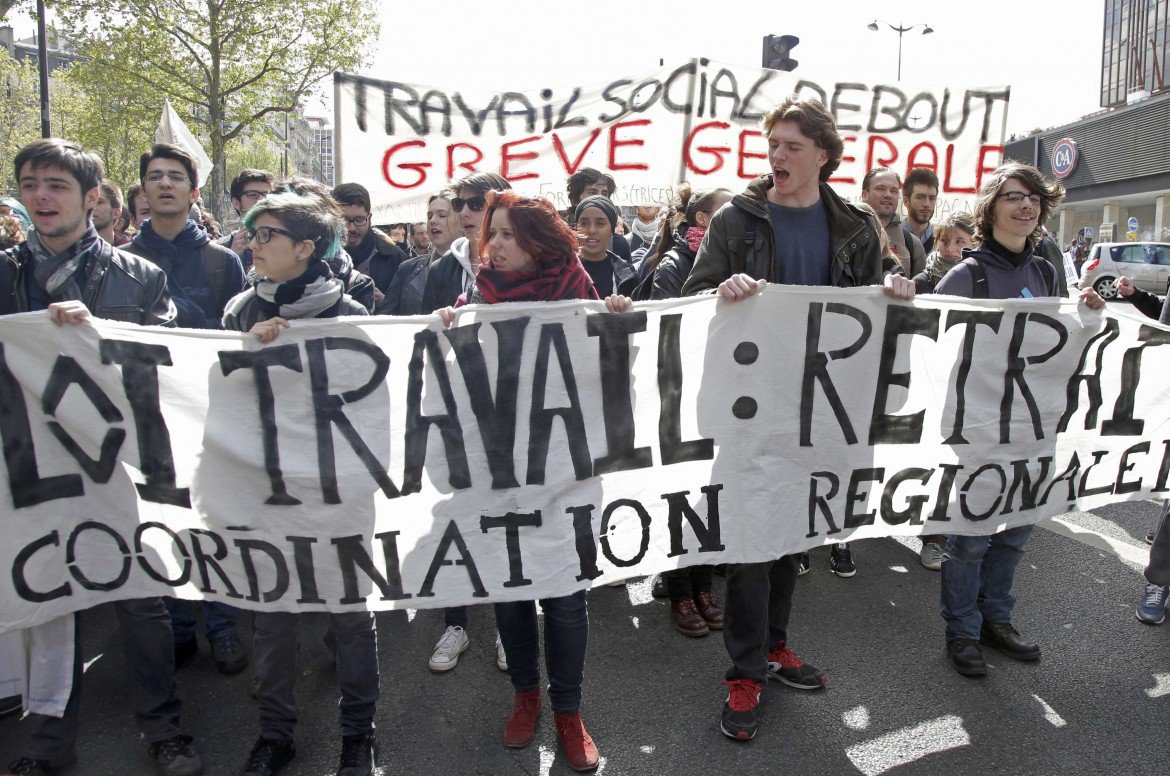France
French labor law heads to parliament as police storm the streets
The government may attempt to push through a labor law that continues to draw massive opposition.

The law that no one wants, the proposed French labor law, came before the National Assembly on Tuesday. The bill, “Loi Travail” in French, has been contested for more than two months in the streets and is now considered a shell of its former self after changes made to the original version with contributions from the French Democratic Confederation of Labor (CFDT).
Here it will face a barrage of about 5,000 amendments for a text of just 54 pages. After 15 days of debate, the vote is scheduled for May 17, and the government — which lacks the 40 votes needed for a majority — could be forced to resort to section 49.3 of the French Constitution: that is, to send the bill through without a vote (the opposition can only reject the measure through a vote of no confidence to the government). Then it’s up to the Senate.
Tuesday morning, a few hours before the start of parliamentary debate, Nuit Debout protesters gathered at the Place de la Concorde, in front of the National Assembly on the right bank of the Seine. Later they joined an event at Les Invalides organized by trade unions and students against the law.
There were also moments of tension, which now characterize the dispute, with a RoboCop-style police presence. Not far from the Assembly, a more radical group found itself in front of a wall of police chanting: “murderer capitalism,” “we are all vandals,” “general strike.” There were demonstrations in Rennes, Toulouse and Marseille. In Nanterre, people protested the detention of 13 high school students accused of setting fire to the front of their school on April 5.
With May 12 marked as another scheduled day of demonstrations, left-wing politicians (Pierre Laurent and Daniel Cohn-Bendit) and intellectuals (including Etienne Balibar) have signed an appeal to prohibit police use of Flash-Balls — a kind of non-lethal weapon to disperse crowds — after a young man lost an eye in Rennes on April 28.
At Les Invalides, Philippe Martinez, secretary of the General Confederation of Labor, repeated: “We will go all the way. We are as determined as we were the first day. You have to reset the clocks to zero for a true dialogue and not the law of the jungle.” Jean-Claude Mailly, secretary of the Workers’ Force (FO), has always pushed for the law’s withdrawal. “We struggle for tomorrow, for all generations,” he said, but added, “if they change everything, we’ll see.”
In the National Assembly, delegates are sharpening the knives. Labor Minister Myriam El Khomri defended the “ambitions” of her labor law, saying it would create “more space for social dialogue, visibility and clarity for businesses; to encourage recruitment indefinitely, while today there are 90 percent fixed-term; and modernize the European social model.”
The rapporteur, socialist MP Christophe Sirugue, is searching for ways to please the ever-growing opposition faction within the Socialist Party. There have been changes to the text to smooth the rough edges, but the result is the same: a jobs act that makes it easier to fire employees in the name of a neoliberal economic theory to promote hiring. Among the points most contested by the unions is the “reversal of the hierarchy of norms,” granting companies primacy in collective bargaining agreements. Also contested is the increased flexibility to deviate from national contracts.
Gérard Filoche, of the Socialist Party faction, denounced these “voodoo economics.” The French Communist Party said it was ready to vote on all the points of order, even those made by the right, just to block the law. Prime Minister Manuel Valls asked the Socialist Party delegates to “take into account the agreement with the unions reformists,” the CFDT, which allowed the abandonment of the compensation ceiling in labor courts in cases of unfair dismissal, the extension of “youth guarantees” and “personal account of activity,” and the progressive accumulation of rights for the worker (through changes of employer).
To the right the original law is “unnatural.” Pierre Gattaz, president of the Movement of French Enterprises (employers), called it “scary.” François Hollande, who on Tuesday celebrated the 80th anniversary of the Popular Front, considers the current version “a dynamic and fair compromise, a progress text.” El Khomri accuses the protesters of making a “caricature” of the bill.
The government has decided to do away with the Nuit Debout. After May 1, Paris was tense, with an aggressive police presence of more than 1,000 officers, to the point that Jean-Luc Mélenchon (Left Party) fears that sooner or later someone will end up dead. The police have set a curfew at the Place de la République: After 10 p.m., meetings, alcohol and music are forbidden.
Originally published at http://ilmanifesto.info/la-loi-travail-in-parlamento/ on 2016-05-04
